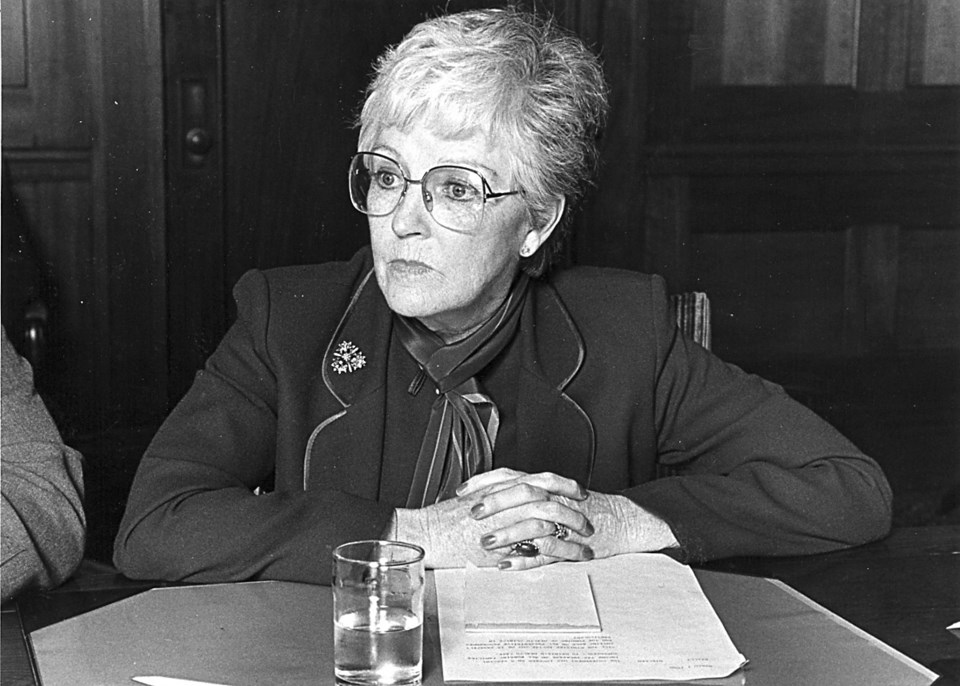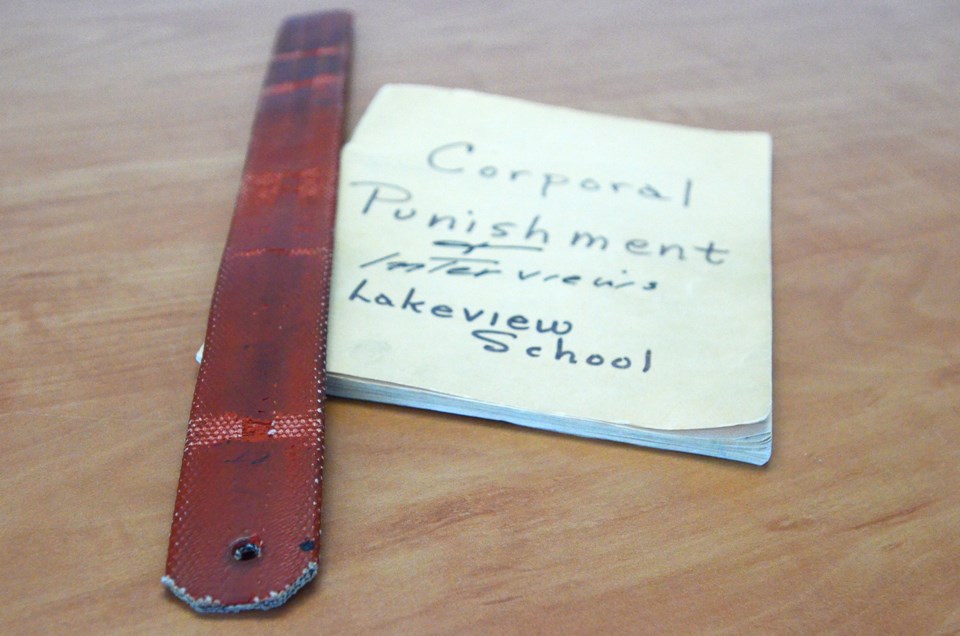Like a casualty of war, hours before a ceasefire is declared, 12-year-old Wade Sandberg was hauled into the principal’s office at Burnaby’s Lakeview Elementary on Feb. 6, 1973.
He had called his school librarian an “old bag.”
His punishment is summed up in an old log book: “three on each.”
Sandberg was the last student ever strapped at Lakeview.
Eight days later, the B.C. government passed legislation banning the punishment.
“I was a little sh**, I fully admit it and probably deserved it,” Sandberg told the NOW. “I don’t have any ill will towards it. I mean, that was the way it was back then when we were growing up, but I’m glad to see that maybe there are some things that have changed.”
For 40 years, the strap used to mete out Sandberg’s punishment and a log book detailing Lakeview strappings from Oct. 3, 1958 to Feb. 6, 1973 have survived tucked away in a desk in the principal’s office.
Every new administrator who moves in eventually makes the discovery.
“Oh my god, this is the strap!”
That was former Lakeview principal Kelly Chow’s reaction when he first opened his desk at the school in January 2007.
Thumbing through the log book – which opens with the strapping of a student for sliding down a handrail – Chow said he was horrified.
“I just thought, wow, this seems so archaic, so abusive,” he said, “but I also thought how progressive we are as an education system. We no longer do that. We’ve come a long way in terms of how we deal with kids, in terms of how we respond.”

Back in the 1940s and ’50s, though, the strap and other forms of corporal punishment were alive and well at local schools, according to retired teacher Janet White, one of five people currently working on a history of the Burnaby district.
White, who taught in Burnaby from 1973 to 2002, was also a student here and got the strap six times for offences like talking, running across the school lawn, throwing a chestnut at a boy and writing on her desk.
“It would swell up and bruise and it would hurt like heck,” she said, describing her hand after getting whacked.
The standard punishment saw students taken to the office where they would hold out their hands, one at a time, palms up.
A teacher or principal would then stand facing them and bring the strap down across the length of their hands, according to White.
“It was supposed to be on your hand,” she said, “but sometimes it would overlap and hit your wrist.”
Some former students report having felt humiliated, but White said it was the pain that made her cry.
“Even for girls, you tried not to cry,” she said.
When White returned to Burnaby to teach in April 1973, the province had already passed legislation banning the strap, but the new rules hadn’t yet come into effect.
As a teacher, her one and only experience with the punishment was when she reported a misbehaving student to the office and then had to act as witness while her principal strapped him.
“The kid must have done something,” she said. “I don’t even remember what it was, but I remember feeling terrible about having to watch. I never reported a kid ever again because I didn’t want to ever go through that again.”

Another local educator who reportedly swore off the strap after an up-close-and-personal encounter was the late Eileen Dailly.
A former Burnaby teacher and trustee, Dailly had risen to the post of education minister by the time Wade Sandberg was strapped for the last time at Lakeview.
During her three-year tenure as minister, B.C. became the first province in Canada (and one of only a handful of jurisdictions in North America) to ban corporal punishment.
Some stories suggest the then-controversial move – which earned Dailly hundreds of death threats – was motivated by an experience she had had in her first year of teaching, when she was told to strap a student who had run her purse up the flagpole.
But former Burnaby city councillor Celeste Redman, who worked politically with Dailly, said it was her experience as a Burnaby school trustee that inspired the ban.
“There were some various incidences where teachers overreacted,” Redman told the NOW in 2011, “and she saw it was hard to draw the line between what’s too much and what’s not enough.”

All that is ancient history to current Lakeview principal Frankie Devita, the current guardian of his school’s two ghosts of education past.
He was two years old when the strap was banned, and he said the strap and log book at his school weren’t all that interesting to him when he discovered them in his desk.
Today, he said, schools focus on teaching kids social and emotional skills instead of just punishing bad behaviour, and a visit to the principal’s office is more likely to be a happy event than a scary one.
“Ninety per cent of the kids that come into the office, it’s about positive reinforcement; they’re showing me work and the great things that they’re doing,” Devita said. “That establishes a relationship. There’s no fear coming into the office. The strap is fear-based, and I don’t believe that fear-based works.”
Did it work for 12-year-old Wade Sandberg?
“I’m sure it did. I don’t know. It was so long ago,” Sandberg said.
The former Lakeview student, who now has grown kids of his own, said the strap was what it was, and he wasn’t traumatized by it – but that doesn’t mean he wasn’t happy to see it banned.
“Having raised children and put them through the school system and dealing with the things that they do, you understand that there’s no place for a teacher or principal beating your child,” he said.



